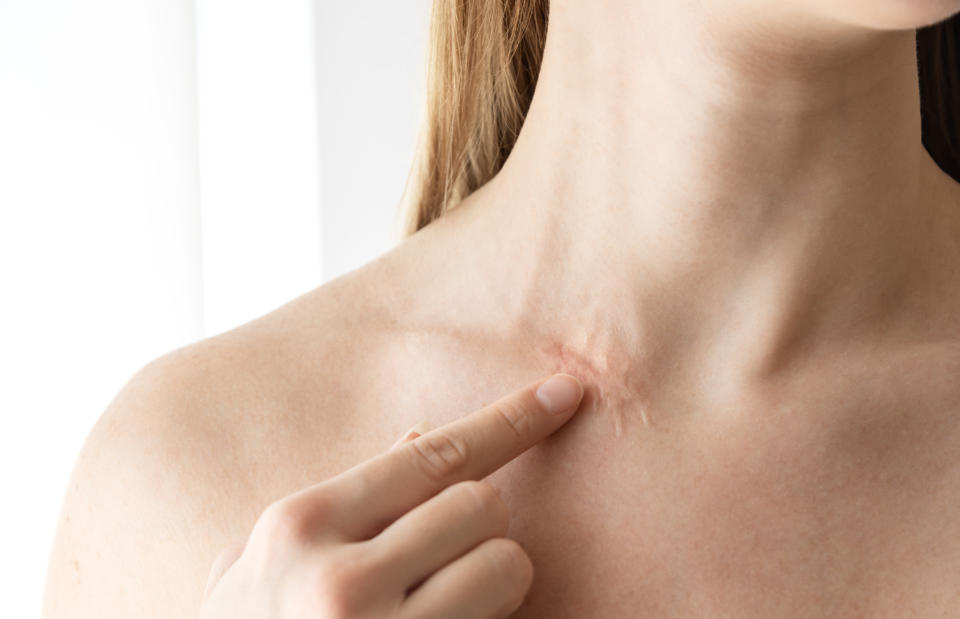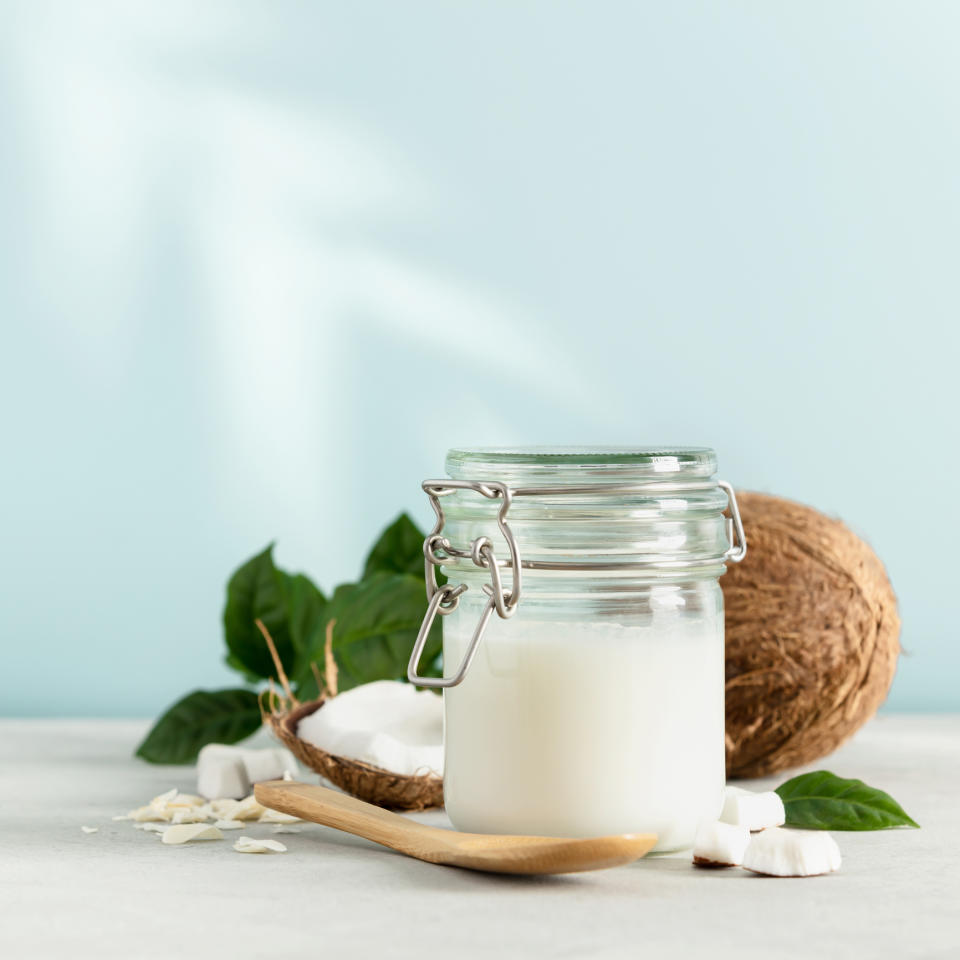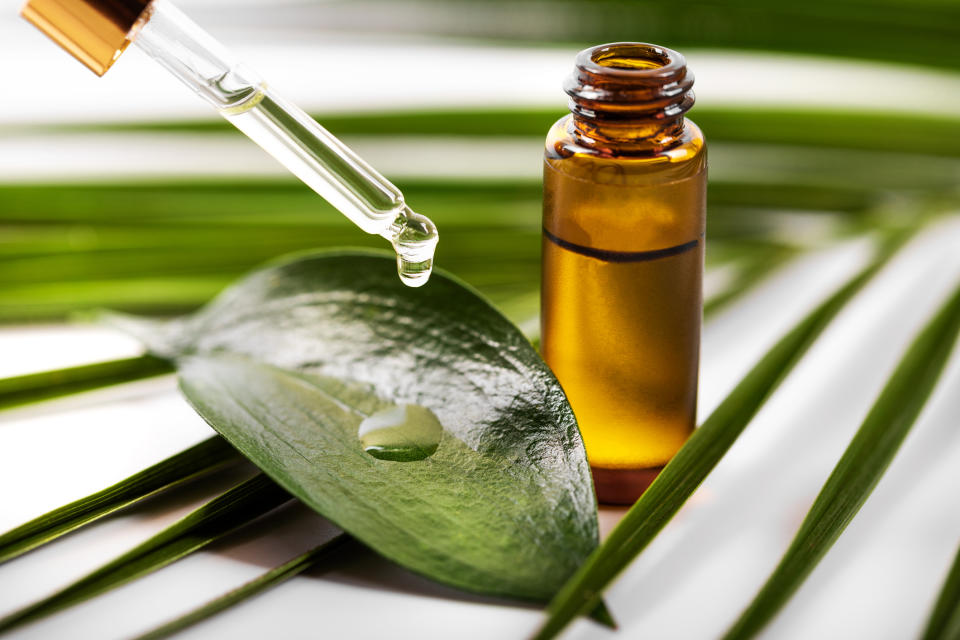Skincare Experts Weigh In on Scar Treatments that Work to Fade Color and Texture
Scars — we’ve all got ‘em. Whether they’re from a stumble we took in first grade, or from a recent, unexpected accident, each scar on our body tells a story. Our individual scars make us unique, but oftentimes, we want them faded, especially if they’re very raised or leave us feeling self-conscious. A recent study in Dermatologic Surgery found that most over-the-counter scar-eliminating products contain questionable allergens and ingredients such as phenoxyethanol and parabens may harm sensitive skin. If you’d like to fade your scars in a more holistic way, keep scrolling as we asked skincare experts to break down the best at home scar remedies using healthy-for-you ingredients and things you likely have at home or are easy to obtain. Bonus, they likely cost less than their over-the-counter counterparts.
Which scars heal fastest?
Did you ever notice some scars heal or flatten faster than others? Why is that?
“Various factors affect scar healing including genetics, plus overall health, age, diet and skincare routines,” explains board-certified dermatologist Jody Alpert Levine, MD of New York City. “In the event of an injury or burn, consulting with a board-certified plastic surgeon as soon as possible will increase the chance of a better outcome.
According to Dr. Levine, hypertrophic scars (which are thick and raised) and keloid scars (which grows out beyond the boundaries of the injury) usually take longer to fade. This is because “some areas are more prone to poor healing and some people are genetically predisposed to increased scar production.”
Basically, she adds, superficial scars, which are usually thin and not raised, scars located in areas of great blood supply (such as the face) and scars located in areas with excess skin (such as the abdomen) often heal better.
9 at-home scar remedies to try

1. Silicone sheets
These are your best bet when it comes to fading scars. “Silicone scar sheets are a well-documented mainstay of treatment for hypertrophic and keloid scars. They help improve their texture and thickness while limiting further scarring,” explains Dr. Levine. “They create a protective barrier, promote collagen growth and provide hydration to the scar.”
Although silicone gets a thumbs-up when it comes to scar healing, Dr. Levine stresses they should not be used on any open wounds or infected areas.
Mariano Busso, MD, a board-certified dermatologist with offices in Beverly Hills and Miami, also likes silicone scar sheets and recommends using ScarAway.
2. Petroleum jelly
Several natural and holistic products can be at home scar remedies. By applying them, you can bypass those allergen-filled gels, creams and oils.
That yellow tube of magic (that’s right — traditional Vaseline!) is highly recommended by YouTube personalities Muneeb Shah, DO and Luke Maxfield, DO, FAAD, board-certified dermatologists known as “Doctorly.”
In their viral video about scar healing, “Doctorly” says to dab on Vaseline after washing the infected area with soap and water. According to Dr. Shah, Vaseline creates an occlusive barrier that keeps the wound moist, which is essential for healing. The bruised skin cells “leapfrog” over each other when Vaseline is applied, and therefore are able to effectively regenerate.
Related: 10 Brilliant Uses for Petroleum Jelly That May Surprise You
3. Aloe vera
More than just an extract to calm down a sunburn, Salar Hazany, MD, a board-certified dermatologist based in Beverly Hills, says this succulent plant commonly found in Mexico helps moisturize the skin and reduce inflammation, which may aid in scar healing. “It’s a natural astringent.”
4. Coconut oil

Coconut oil is a great at home scar remedy thanks to it being rich in fatty acids and antioxidants that can help improve skin elasticity and hydration, “potentially reducing the appearance of scars over time,” says Dr. Hazany.
Related: How Coconut Oil Can Strengthen Hair, Reverse Thinning and More — For Pennies!
5. Snail slime
Snail mucin extract has been a beauty rage lately for moisturizing. Dr. Hazany says it also promotes wound-healing due to its collagen production, “and reduces scar texture because of its hydrating effects and growth factors contained within it.” (Click through to learn more about how snail slime can help you look younger.)
6. Honey
More than just a sweet treat for your tea, thanks to its antimicrobial and anti-inflammatory properties, “honey can help promote wound healing and reduce scar formation,” explains Dr. Hazany. “There are medical-grade honey products used in hospitals around the world to heal chronic wounds.”
7. Rosehip seed oil
A study was conducted about a decade ago, says Dr. Busso, “that reported that applying rosehip seed oil twice daily for 12 weeks does improve the appearance of post-surgical scars.”
8. Tea tree oil

Also, explains Dr. Busso, tea tree oil may minimize the appearance of raised (hypertrophic) scars “and reduce the severity of acne breakouts.” (Click though to learn how tea tree oil helps eczema flare-ups).
9. Gold
If you like professional skincare treatments, chances are you’ve notice gold-extract facials are gaining momentum. This is partly because they can help fade acne scars on the face.
“Precious metals are becoming a popular ingredient in skin care,” says Rachel Lee Lozina, an Oyster Bay, NY-based licensed esthetician. “Gold and platinum help reduce inflammation and neutralize oxidative damage.” Because they can also help stimulate collagen in the face, in turn, gold and platinum extracts “can help with acne and scarring.”
What at home scar remedies you should avoid
Vitamin E: Now, interestingly, you might assume vitamin E works wonders on scars because it was all the rage years ago. Key word: WAS.
“Even though applying vitamin E extract oil directly onto your scar has been a popular ‘go-to’ over the past few decades, individual responses vary, and high doses may have adverse effects,” warns Dr. Busso.
Cocoa butter: “Also, avoid cocoa butter. It stimulates collagen production, which does NOT help flatten hypertrophic (raised) scars. Plus, its oily nature can clog your pores and cause skin reactions.”
Apple cider vinegar: Over the years, there were "rumors" that apple cider vinegar can help fade scars. According to Dr. Busso, its mild exfoliation properties may help reduce the appearance of light scarring, “but beware that using it in concentrated form can actually burn your skin, causing lasting damage.”
Citrus extracts: Also, stay away from lemon and lime extracts. Dr. Busso explains that lemon is overall ineffective (it may lightly fade a dark scar, but that’s it) and lime juice can cause blisters. Pass!
Keep this in mind — natural scar remedies may work differently for each person, “and their effectiveness can vary based on the type and severity of the scar,” explains Dr. Hazany. “It's essential to consult with a healthcare professional before trying any new treatment, especially if you have sensitive skin or underlying medical conditions.”
Additionally, he adds, consistency and patience “are key” when using natural methods for scar reduction, as results may take time to become noticeable on our body!
For more skin care tips, click through these stories:
Skincare Pros Reveal How to Get Rid of Keratosis Pilaris for Smooth, Bump-Free Skin
Dry Brushing Your Skin Fights Cellulite & Leaves You Glowing: How to Get the Perks
Why Podiatrists Say You Should Never Ignore Painful Cracked Heels + Easy Home Remedies
